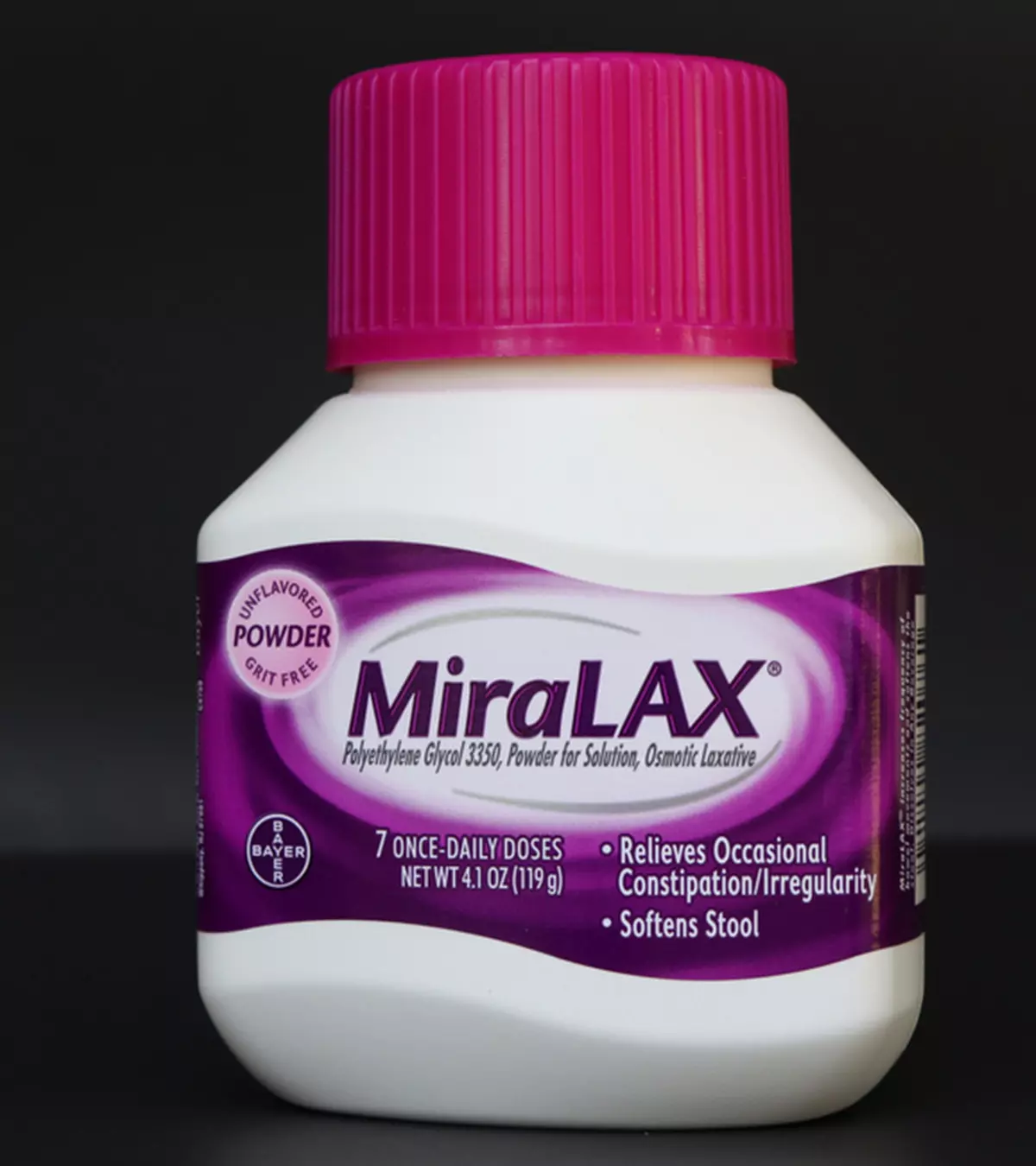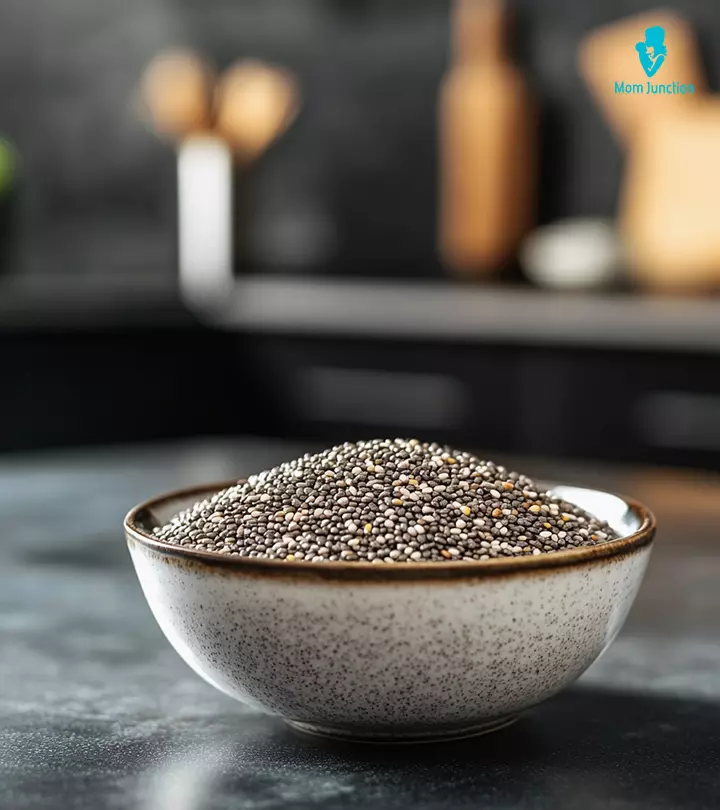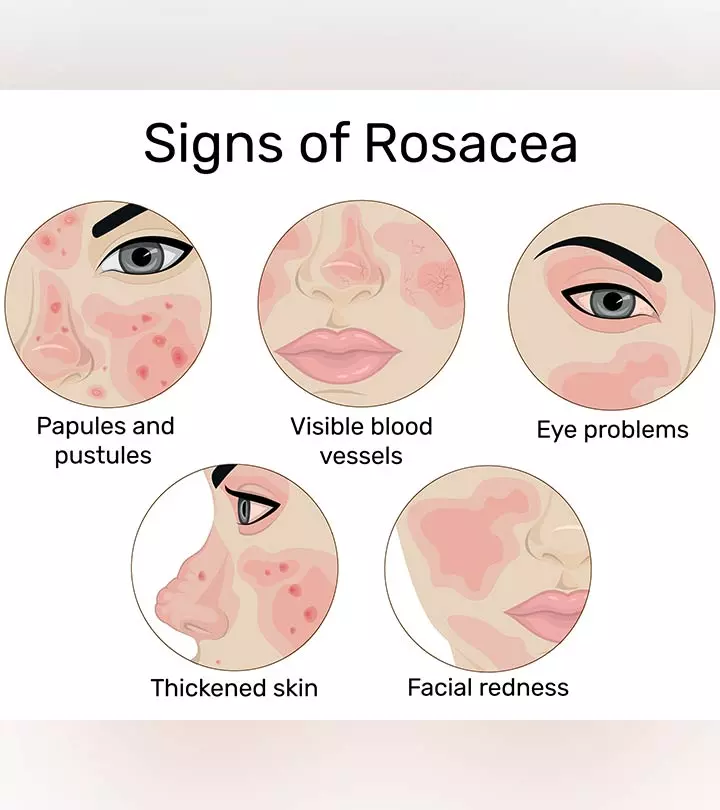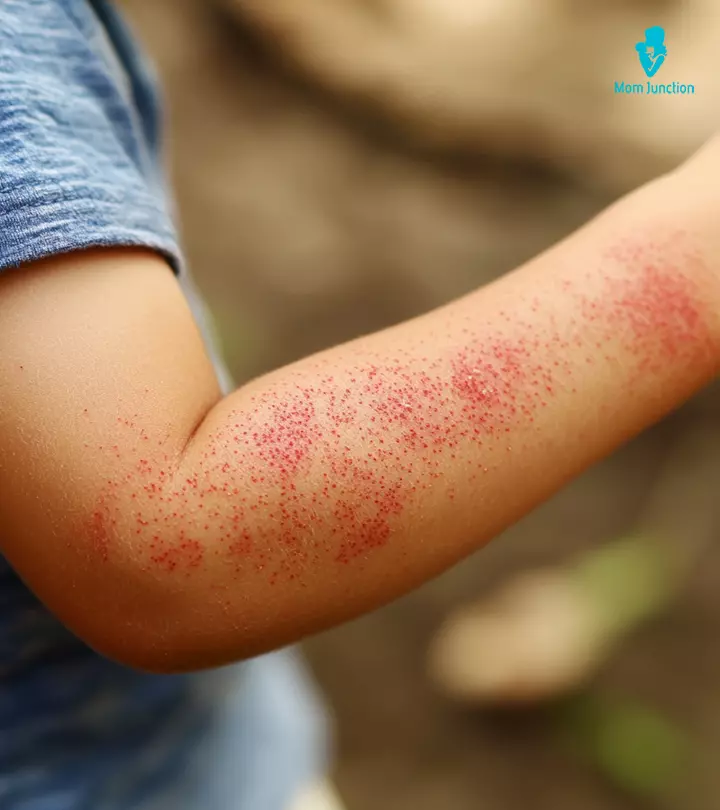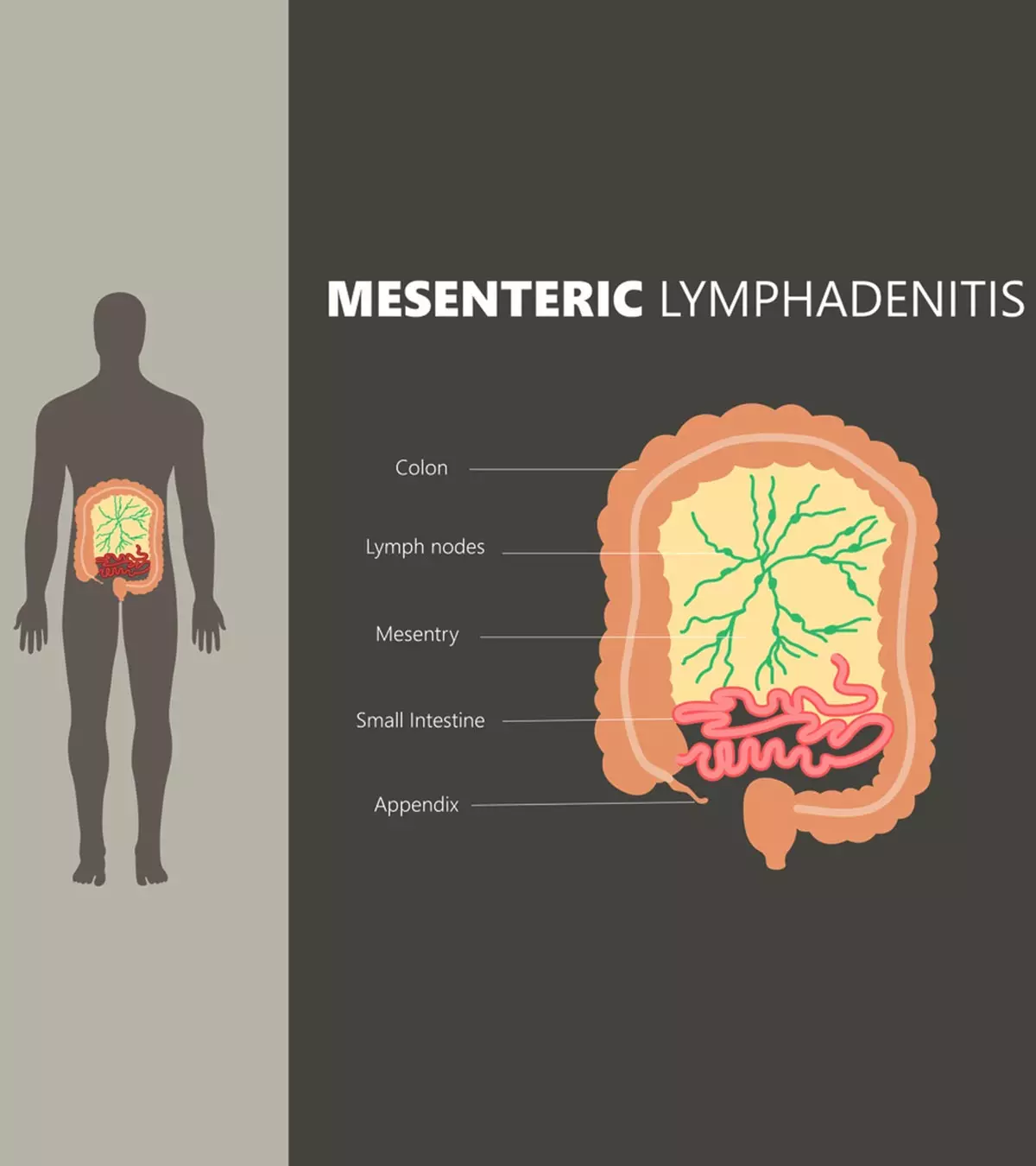
Image: ShutterStock
A widespread abdominal pain may indicate mesenteric lymphadenitis in children. It is the inflammation of the mesenteric lymph nodes, which are clusters of three or more lymph nodes in the right lower mesentery. The peritoneum fold (abdominal cavity membrane) that connects the intestines to the back of the abdominal wall is referred to as the mesentery.
While mesenteric lymphadenitis can occur at any age, it is more common in children (1). Therefore, if your child experiences significant abdominal pain, consult your child’s doctor since it could signify a problem that requires medical attention.
Read on to learn the various causes, symptoms, risk factors, and complications of mesenteric lymphadenitis and how it can be diagnosed, treated, and prevented in the pediatric population.
Key Pointers
- Mesenteric lymphadenitis is commonly seen in children and can occur due to a viral infection of the GI tract.
- Nausea, fever, or pain in the lower right of the abdomen are a few symptoms they may experience.
- The doctor may conduct a thorough physical examination and some blood tests to assess the condition.
- Depending on the results, children may be recommended medications or surgical intervention.
- Staying hydrated and warm compress may help manage the situation at home.
Signs And Symptoms Of Mesenteric Lymphadenitis In Children
Mesenteric lymphadenitis is characterized by swollen lymph nodes in children. It can be chronic or acute inflammation, depending on the microorganism causing it. Some gastrointestinal symptoms of mesenteric lymphadenitis may include (2):
- Abdominal pain on the lower right side
- Fever
- Abdominal tenderness
- Enlarged mesenteric lymph nodes (not palpable but diagnosed with ultrasound scan)
- Nausea
- Vomiting
- Diarrhea
Widespread lower right quadrant abdominal pain is a common symptom of mesenteric lymphadenitis in most children
. The above-mentioned signs and symptoms can also be seen in other diseases and may also vary in mesenteric lymphadenitis, depending on the cause.
Causes Of Mesenteric Lymphadenitis In Children
Viral infections are a major cause of mesenteric lymphadenitis in children. Viral gastrointestinal tract infections, such as stomach flu (viral gastroenteritisiInfectious disease leading to inflammation of the digestive tract with symptoms such as abdominal pain, diarrhea, and nausea ), may cause inflammation of the mesenteric lymph nodes.
The following conditions may also cause inflammation or enlargement of mesenteric lymph nodes (3).
- Bacterial gastroenteritis
- Inflammatory bowel diseases (IBD)
- Lymphoma
 Point to consider
Point to considerRisk Factors And Complications Of Lymphadenitis In Children

The risk factors for mesenteric lymphadenitis can be similar to the risk factors for bacterial or viral gastroenteritis, such as the consumption of contaminated food and water. Children with diagnosed IBD or lymphoma may also have a high risk of lymphadenitis.
Complications of mesenteric lymphadenitis may include (4):
- Dehydration due to electrolyte and water loss from diarrhea and vomiting
- PeritonitisiAn inflammation of the inner lining of the belly, the peritoneum, due to infection, surgery, or underlying condition
- Sepsis
- AbscessiA painful cavity anywhere on the body, filled with infected tissue (pus), often caused by an infection
- Arthralgia (joint pain)
When To See A Doctor
Abdominal pain is common in children and teens, and it can be hard to know when it requires medical attention. However, if your child has severe, sudden onset of abdominal pain, seek immediate medical care since this can even be the symptom of appendicitisiThe inflammation or infection of the appendix, causing pain, digestive problems, and nausea . Abdominal pain with fever, diarrhea, or vomiting also requires medical care to avoid complications (5).
Diagnosis Of Mesenteric Lymphadenitis In Children
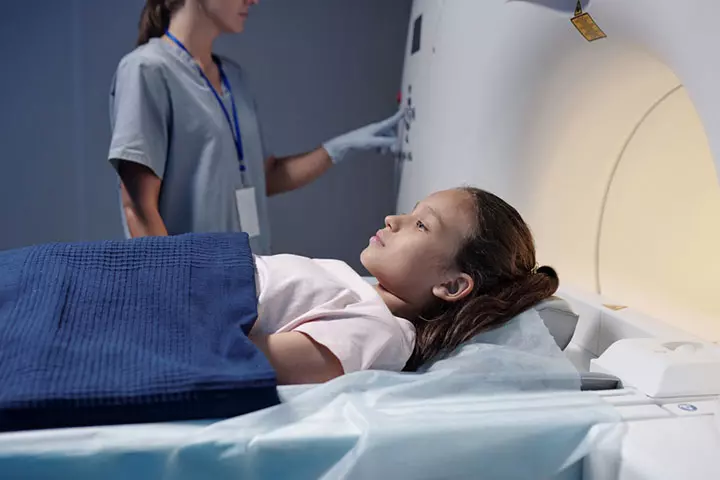
Pediatricians will perform a physical examination and also ask about your child’s symptoms and medical history. Depending on the history and physical exam findings, they may order blood tests and abdominal imaging tests to confirm the diagnosis of mesenteric lymphadenitis (6).
Blood tests could help confirm the presence and type of infection, and imaging tests such as abdominal ultrasound or a CT scan give a visualization of mesenteric lymph nodes. Thus, these tests rule out other differential diagnoses of mesenteric lymphadenitis.
Lifestyle And Home Remedies For Lymphadenitis
Mild mesenteric adenitis after stomach flu can be managed at home through the following ways (5).
- Adequate rest to enhance recovery

- Drink enough fluids to prevent dehydration
- Warm moist heat application using washcloth over the abdomen may help ease pain and discomfort
Home remedies are enough to treat mild conditions since it is a self-resolving disease. However, seeking expert advice is always helpful to confirm the diagnosis and exclude other causes of abdominal pain in children.
Treatment For Mesenteric Lymphadenitis In Children
Treatment for mesenteric lymphadenitis depends on the underlying cause and severity of the disease. Treatment may include (7):
- Supportive care with adequate hydration.
- Mild and uncomplicated mesenteric lymphadenitis due to viral gastroenteritis can be self-limiting and completely resolves within a month or more.
- Mild cases may not require any specific therapies, and symptoms can be treated by over-the-counter pain and fever medications, such as Tylenol (acetaminophen) and Advil or Motrin (ibuprofen). Aspirin should be avoided since it may cause Reye's syndromeiA rare condition of swelling in the liver and brain leading to loss of consciousness, confusion, or seizures .
- Moderate to severe lymphadenitis caused by a bacterial infection requires antibiotic treatment.
- Complications such as suppuration, abscess, or peritonitis are managed with abdominal surgery (laparotomy) and antibiotics.
Although mesenteric lymphadenitis can be cured completely in many children without specific management, a few children with severe infection and associated sepsis may require hospitalization and aggressive management. Untreated severe lymphadenitis can be life-threatening in children.
How To Prevent Mesenteric Lymphadenitis In Children?
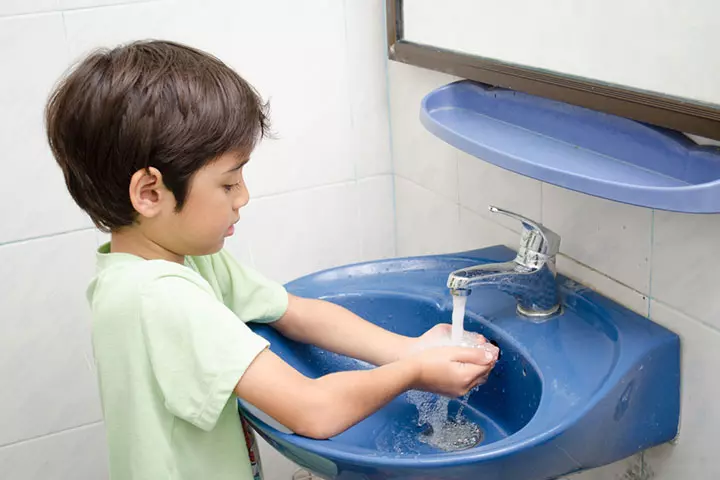
Preventing bacterial and viral infections helps reduce the risk of mesenteric lymphadenitis in children. The following precautions may help reduce the risk of infectious pediatric illnesses in children (8).
- Wash hands with soap and water
- Avoid close contact with sick people
- Do not consume contaminated food and water
 Quick tip
Quick tipFrequently Asked Questions
1. Is mesenteric lymphadenitis serious?
Mesenteric lymphadenitis is seldom serious in children since it often resolves without complications. Although the abdominal pain can mimic an acute abdomen, it may not require emergency interventions, such as appendicitis or intussusception (9).
2. Can COVID-19 cause mesenteric lymphadenitis?
Children with COVID-19 gastrointestinal infections are reported to have mesenteric lymphadenopathy. The imaging tests confirmed the involvement of mesenteric lymphadenopathy in children presenting with abdominal pain. However, most developed severe illnesses require intensive care for COVID-19 symptoms before recovering from mesenteric lymphadenopathy (10).
3. How long does it take for mesenteric lymphadenitis to go away?
Most children can completely recover within four weeks or around. Usually, mild and uncomplicated cases of mesenteric lymphadenitis resolve without specific treatments (9).
4. Can lymphadenitis spread?
Yes. The lymph nodes are infected by either a bacteria, a virus, or a fungus. Once into the lymph nodes, this infection can spread into your bloodstream and other body parts. It needs to be treated quickly to prevent it from spreading through your body.
5. What is the normal size of mesenteric lymph nodes in a child?
According to a study, the lymph nodes of children with mesenteric lymphadenitis and the lymph nodes of normal children were examined with superb microvascular imaging. It showed that the least diameter of lymph nodes in cases of mesenteric lymphadenitis was 0.58±0.15 mm, and of normal mesenteric lymph nodes was 0.47±0.08 mm (p(12).
Mesenteric lymphadenitis in children is an inflammatory condition that can cause fever, abdominal pain, and tenderness. It is recommended to evaluate the sudden onset of severe abdominal pain in children than giving pain relievers since it may mask symptoms. It is the inflammation of lymph nodes attached to the intestines on the lower right side of the abdominal wall. Children with lymphomaiCancer of the lymphatic system, the body’s defense system, that can be environmentally or genetically induced , bacterial gastroenteritis, and inflammatory bowel diseases (IBD) are more prone to develop mesenteric lymphadenitis than others. If left unmanaged, it might complicate sepsisiThe body’s most extreme response to an infection characterized by bacteria entering the bloodstream , peritonitis, and abscess formation. Symptomatic management, antibiotic therapy, or surgery is prescribed depending on the severity of the condition.
Infographic: Potential Causes Of Mesenteric Lymphadenitis In Children
If left untreated, mesenteric lymphadenitis can dehydrate the child and cause severe complications, such as sepsis and arthralgia. Therefore, timely diagnosis and treatment is necessary. The infographic below lists various reasons for mesenteric lymphadenitis in children and preventive tips.

Illustration: Momjunction Design Team
Illustration: Mesenteric Lymphadenitis In Children: Symptoms And Treatment

Image: Stable Diffusion/MomJunction Design Team
References
1. Rossana Helbling, et al.; Acute Nonspecific Mesenteric Lymphadenitis: More Than “No Need for Surgery; The United States National Library of Medicine
2. Mesenteric Lymphadenitis; Cleveland Clinic
3. What is Mesenteric Adenitis?; Keystone Medical Healthcare services
4. Megan Birkhold and Scott Langenburg; Is mesenteric adenitis a benign condition? Ischemic colitis secondary to mesenteric adenitis in a 12 year old; Sciencedirect; Journal of Pediatric Surgery Case Reports
5. Mesenteric lymphadenitis; Mayoclinic
6. Mesenteric adenitis; Women’s & Children’s Hospital
7. Mesenteric Lymphadenitis; OMICS International
8. Mesenteric Lymphadenitis; Cleaveland Clinic.
9. Mesenteric Lymphadenitis; St. Clair Health.
10. Sakura Noda, et al; Severe COVID-19 initially presenting as mesenteric adenopathy; National Library of Medicine
11. Lymphadenitis; Johns Hopkins Medicine
12. Dao-Ming Zu, et al.; (2019); Evaluation of Mesenteric Lymph Nodes in a Pediatric Population with Mesenteric Lymphadenitis Using Superb Microvascular Imaging; NCBI
Community Experiences
Join the conversation and become a part of our nurturing community! Share your stories, experiences, and insights to connect with fellow parents.
Read full bio of Dr. Elna Gibson
Read full bio of Dr Bisny T. Joseph
Read full bio of Swati Patwal
Read full bio of Anindita Ghatak








